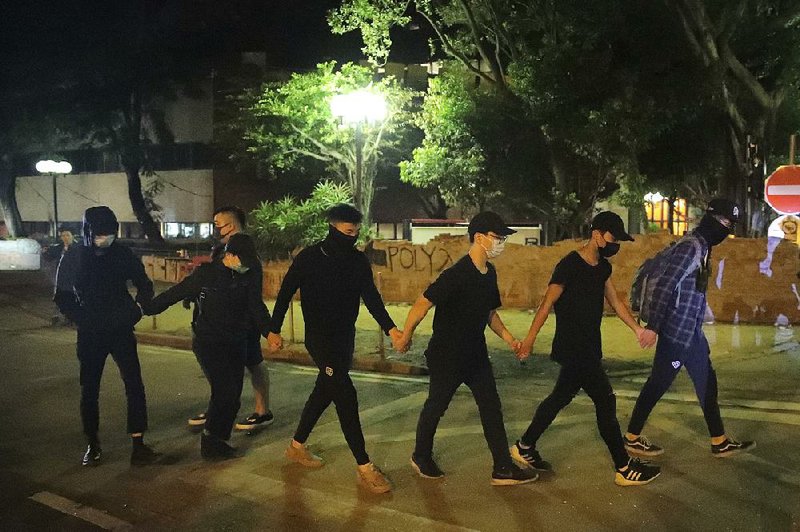HONG KONG -- Six masked protesters surrendered early today in Hong Kong, raising to about 30 the number that have come out in the past day from a university campus surrounded by police.
The protesters held hands as they walked toward a checkpoint before dawn today. Police are arresting all the adults. Those under 18 can go home but may face charges later.
On Thursday, 10 protesters walked out together and were escorted to a police post outside the campus, while three were carried out on stretchers and four taken in wheelchairs. Five other students, believed to be minors, exited with their parents and were allowed to leave after police took their information.
Most of the protesters who took over Hong Kong Polytechnic University last week have left, but an unknown number remain inside. They are the holdouts from a much larger group that occupied the campus after battling police over the weekend. Some 1,000 protesters have either surrendered or been stopped while trying to flee.
The city's largest political party slammed the flare-up in violence in the past week and urged about 4.1 million voters to use the ballot box this Sunday to reject the "black force" that had thrown the semiautonomous Chinese territory into unprecedented turmoil since June.
"The black force say they want to fight for freedom, but now people cannot even express their views freely. We have even been stripped of our right to go to school and work," said Starry Lee, who heads the Democratic Alliance for the Betterment and Progress of Hong Kong.
The party is contesting 181 of the 452 district council seats, a low-level neighborhood election held every four years and dominated by the pro-establishment camp. For the first time, all the seats will be contested. Public anger against the government and police could give a victory to the pro-democracy bloc that would bolster the legitimacy of the protest movement.
"We cannot give even a single vote to the pro-establishment camp," said a mother, who with her young son joined hundreds of people at a sit-in protest at a mall against an attack on protesters four months ago. A live video of the protest was broadcast by Apple Daily newspaper.
Protesters, who believe mainland China is increasing its control over the territory, are demanding fully democratic elections and an independent probe into alleged police brutality against demonstrators. The government rejected the demands and has warned the polls could be delayed if violence persists and transport links are disrupted.
A Hong Kong restaurant owner was deported from Singapore for organizing an illegal gathering last month to discuss the protests, Singapore media outlets reported. Alex Yeung, who founded the Wah Kee restaurant chain and is a staunch Beijing supporter, also will be barred from entering Singapore without previous approval.
In a video posted on YouTube from Singapore's Changi Airport, Yeung said he has been warned to refrain from any criminal conduct. He didn't say where he was heading but urged Hong Kong residents to cast their votes on Sunday to "reject violence and support peace."
More than 5,000 people have been arrested since the protests started in June over a now-abandoned extradition bill that would have allowed criminal suspects to be sent to mainland China for trial. The protests have since swelled into an anti-China movement as many fear a loss of freedoms guaranteed to the former British colony when it returned to Chinese control in 1997.
In the U.S., House Speaker Nancy Pelosi sent President Donald Trump legislation supporting Hong Kong protesters, and the president is expected to sign the bill into law despite Chinese warnings of retaliation.
"For us, this is a really a very, very proud day," Pelosi said at a small ceremony to enroll the bill, which passed unanimously in the Senate and with support from all but one Republican in the House.
Trump plans to sign the bill, according to a person familiar with the matter, even as his administration tries to finalize the first phase of a long-awaited trade deal with China. Even though the Chinese Foreign Ministry warned of "strong countermeasures" in response to the legislation, Vice Premier Liu He on Wednesday said at a private dinner in Beijing that he was "cautiously optimistic" about reaching a trade agreement with the U.S., according to people who attended.
Pelosi acknowledged the economic risks of angering the world's largest emerging market, but she said if the U.S. doesn't "speak up for human rights in China because of commercial issues, we lose all moral authority to speak about human rights anywhere in the world."
Information for this article was contributed by Eileen Ng, Andi Jatmiko, Ken Moritsugu and Katie Tam of The Associated Press; and by Daniel Flatley and Shawn Donnan of Bloomberg News.
A Section on 11/22/2019
